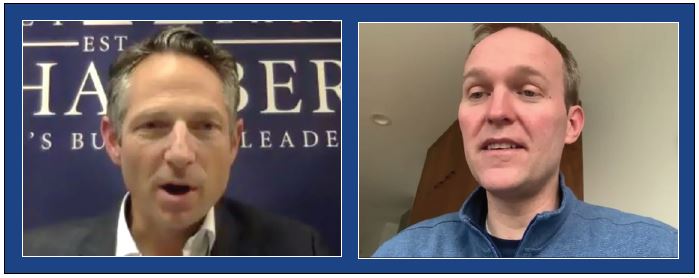By Brice Wallace
State government and business officials are calling on companies and their customers to be innovative in response to the COVID-19 coronavirus.
Speaking on a virtual conference call, members of the Utah Economic Response Task Force, created by Gov. Gary Herbert, listed various websites that serve as resources for companies and employees dealing with the virus and called upon those same groups to share creative ideas.
“Getting this information specifically from industries is going to be critical to the process — what their needs are as well as what they’re doing to stay open and to stay healthy and to keep commerce flowing,” said Derek Miller, president and CEO of the Salt Lake Chamber and task force chairman.
Herbert said officials need to hear from the private sector about “what is stopping you from being successful.”
Among the task force’s actions are consolidating and curating information for businesses to access related to resources and tools available to help them navigate the virus impacts. That includes adding a business section to the chamber’s website about the virus.
The task force also will make policy recommendations to government leaders and will focus on communicating what it has learned.
“We can have the best information in the world, but if it doesn’t get to the people who need it, we will not have accomplished the mission,” Miller said. “Our watchword is for businesses to adapt, innovate and overcome so that they can stay not just open for business but so that they can stay safe for business.”
The first of what is expected to be many of the video conferences focused on workforce stabilization strategies. For the Larry H. Miller Group of Companies, they include quarantines of employees, sanitizing workplaces, constant communication with employees, and doing work over the phone or Internet.
Steve Starks, CEO of the company, also stressed innovation. “If you have ideas or suggestions, please share those,” Starks said. “But we would encourage you not to shut down this economy either, because it’s going to be self-fulfilling if we all do that.”
Clark Ivory, CEO of Ivory Homes, said his company has implemented frequent communication, telecommuting, appointment-only meetings, social distancing, maintaining routines and staying engaged and productive.
“To our employees and to my managers, I tell them [to] have a sort a middle-of-the-ground approach, a middle-of-the-road approach, in terms of what we’re communicating,” Ivory said. “Let’s not say this is going to be easy, and let’s not be doomsayers at the same time. … We’ve got to have a positive outlook and yet a realistic outlook.”
Jon Pierpont, executive director of the Utah Department of Workforce Services, said his agency has lots of virus-related information available at its website, including information related to unemployment insurance, furloughs and layoffs, and childcare.
He also noted that the DWS system has 31,000 open positions listed. “So, there are jobs available for individuals that have been displaced or are looking for work,” Pierpont said. “If you’ve been laid off or furloughed and you’re really looking to get either retrained or a new job, we have all sorts of programs and services that we deliver in our 34 employment centers across the state.”
Despite the effects of the virus, including it being “just kind of a cloud over everything,” Herbert tried to stress the positive. He called upon people to golf in small groups, visit parks, stay fit and implement good nutrition. He called it “a great time to buy a home” and “a great time to buy anything.”
“Our economy in virtually every sector other than the hospitality sector is continuing to, in fact, do well,” the governor said. “It’s maybe not roaring like it was before and certainly overall we have to worry about unemployment and the ripple effect downward. We need to see what we can do, in fact, to correct that so we save lives and maintain and minimize the drop in our unemployment.”
Utahns’ lives “don’t have to be totally modified into complete shutdown mode,” he said. “Cows continue to produce milk. Chickens are laying eggs. People are manufacturing toilet paper.”
He, too, stressed the “adapt, innovate and overcome” mantra and the need for public-private partnerships. “We’re going to have some short-term discomfort for the benefit of long-term gain,” Herbert said.
U.S. Rep. Ben McAdams was among those saying action could lessen the virus’ effects.
“The impacts of this are going to be felt across the spectrum, from our restaurants that we’re seeing right now, our arts organizations that run on a shoestring budget and have lost their audiences,” McAdams said.
“The impacts are going to be far and wide and we need to act swiftly, and this is going to be a long process to help us recover out of this and we’re going to see a lot of casualties — small-business casualties and nonprofit casualties — who aren’t able to survive this, but let’s minimize those losses and help them be resilient and bounce back.”
Miller put it another way: “flatten the dip.”
“We’ve all heard a lot about ‘flattening the curve’ as it relates to the progression and hopefully prevention of the coronavirus COVID-19, but our job on the Economic Response Task Force is to flatten the economic dip,” he said.
“I often say that if we do this right, the virus will affect just a few of us. But if we do it wrong, the economic impact will affect all of us.”








